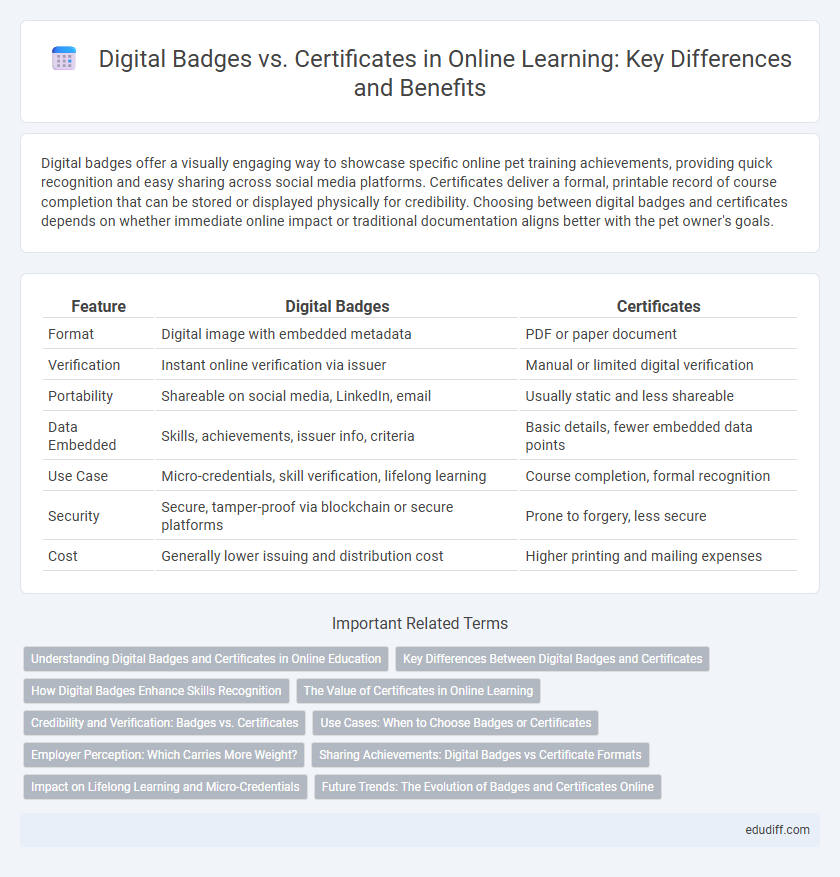Digital badges offer a visually engaging way to showcase specific online pet training achievements, providing quick recognition and easy sharing across social media platforms. Certificates deliver a formal, printable record of course completion that can be stored or displayed physically for credibility. Choosing between digital badges and certificates depends on whether immediate online impact or traditional documentation aligns better with the pet owner's goals.
Table of Comparison
| Feature | Digital Badges | Certificates |
|---|---|---|
| Format | Digital image with embedded metadata | PDF or paper document |
| Verification | Instant online verification via issuer | Manual or limited digital verification |
| Portability | Shareable on social media, LinkedIn, email | Usually static and less shareable |
| Data Embedded | Skills, achievements, issuer info, criteria | Basic details, fewer embedded data points |
| Use Case | Micro-credentials, skill verification, lifelong learning | Course completion, formal recognition |
| Security | Secure, tamper-proof via blockchain or secure platforms | Prone to forgery, less secure |
| Cost | Generally lower issuing and distribution cost | Higher printing and mailing expenses |
Understanding Digital Badges and Certificates in Online Education
Digital badges in online education represent verified achievements using visual symbols embedded with metadata, enabling instant verification and sharing across platforms. Certificates provide formal documentation of course completion or skill mastery, often issued as downloadable PDFs or official transcripts. Digital badges enhance motivation and portable recognition, while certificates offer traditional validation recognized by employers and educational institutions.
Key Differences Between Digital Badges and Certificates
Digital badges represent verifiable, shareable skills or achievements using embedded metadata that enables instant validation, unlike traditional certificates that are static and typically physical documents. Certificates often require manual verification and may lack interoperability across platforms, whereas digital badges integrate seamlessly into social media, professional profiles, and Learning Management Systems (LMS). The dynamic nature of digital badges supports ongoing learning recognition, while certificates mainly signify one-time accomplishment.
How Digital Badges Enhance Skills Recognition
Digital badges provide a dynamic and verifiable way to showcase skills, offering instant validation through embedded metadata that details the issuer, criteria, and competencies achieved. Unlike traditional certificates, badges are easily shareable on professional networks like LinkedIn, enhancing visibility and credibility in online portfolios. This interactive format encourages continuous learning by allowing recipients to accumulate and display multiple badges, reflecting a broader range of skills and achievements.
The Value of Certificates in Online Learning
Certificates in online learning provide verified proof of skill acquisition and course completion, enhancing a learner's credibility for employers and educational institutions. They often carry more weight than digital badges due to standardized formatting and issuer recognition, making them a preferred credential in professional and academic environments. Unlike digital badges, certificates typically include detailed information such as course objectives, duration, and assessment criteria, adding to their value and trustworthiness.
Credibility and Verification: Badges vs. Certificates
Digital badges provide an interactive and easily verifiable method for showcasing skills and achievements, often linked directly to the issuing organization's database for instant authenticity checks. Certificates typically offer a traditional, formal recognition that can be more widely accepted in professional and academic settings but may require manual verification through the issuing institution. Both digital badges and certificates enhance credibility, yet badges excel in real-time verification and shareability across online platforms, while certificates maintain established trust in offline and official contexts.
Use Cases: When to Choose Badges or Certificates
Digital badges are ideal for showcasing micro-credentials and skills acquired through short courses or specific achievements, making them perfect for social media sharing and digital portfolios. Certificates are better suited for formal recognition of course completions, professional qualifications, or extensive training programs that require verified documentation. Choose digital badges for ongoing skill development and certificates for official proof of mastery or compliance.
Employer Perception: Which Carries More Weight?
Employers increasingly value digital badges for their verifiable metadata, which provides detailed information about the skills demonstrated and the issuing organization's credibility, enhancing trust and transparency. Certificates, while traditional and widely recognized, often lack the dynamic and interactive elements that digital badges offer, making badges more appealing in fast-evolving industries like technology and digital marketing. Research from industry surveys indicates that hiring managers appreciate digital badges for their instant authenticity verification and ease of integration into professional profiles on platforms like LinkedIn.
Sharing Achievements: Digital Badges vs Certificate Formats
Digital badges offer dynamic, shareable credentials embedded with metadata that verify skills and achievements across social media platforms, online portfolios, and professional networks. Certificates typically exist as static PDF or printed documents, limiting easy distribution and direct verification. The metadata-rich nature of digital badges enhances online visibility and credibility, supporting real-time validation and interactive engagement beyond traditional certificate formats.
Impact on Lifelong Learning and Micro-Credentials
Digital badges and certificates serve as micro-credentials that significantly enhance lifelong learning by providing verifiable evidence of skill acquisition and competency development. Digital badges offer granular recognition for specific skills or achievements, fostering continuous learning and motivation through easily shareable, portable credentials within professional and educational networks. Certificates typically represent broader accomplishments in formal courses, delivering comprehensive validation that supports career advancement and supports the evolving landscape of competency-based education.
Future Trends: The Evolution of Badges and Certificates Online
Digital badges and certificates are evolving with advancements in blockchain technology, enhancing security and verifiability for online credentials. Integration of AI-driven personalization is shaping how badges and certificates adapt to individual learning paths and professional development. The growing adoption of decentralized platforms ensures lifelong learning records are easily shareable and trusted across global digital ecosystems.
Digital badges vs Certificates Infographic

 edudiff.com
edudiff.com